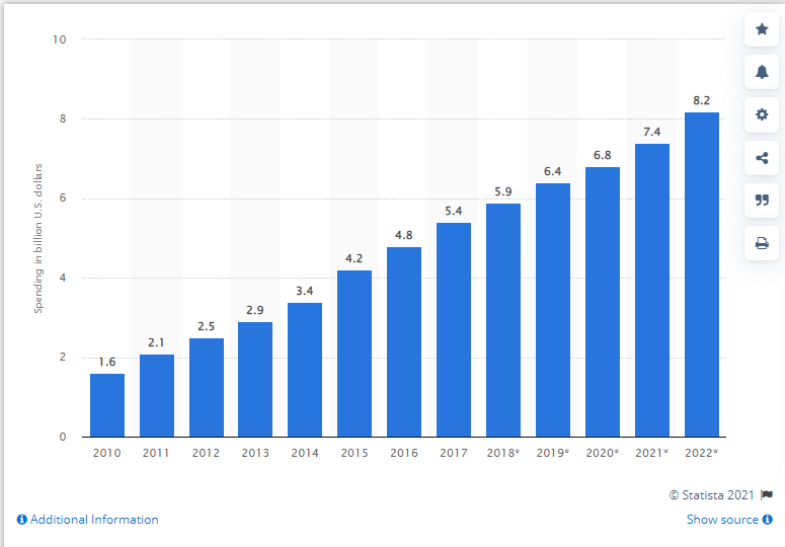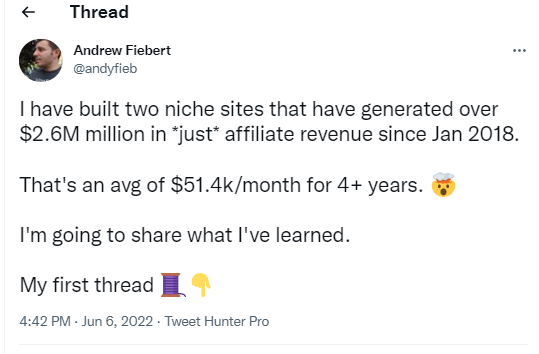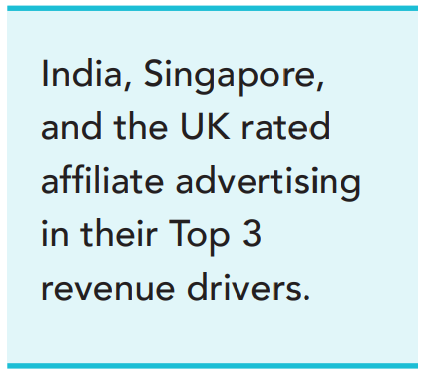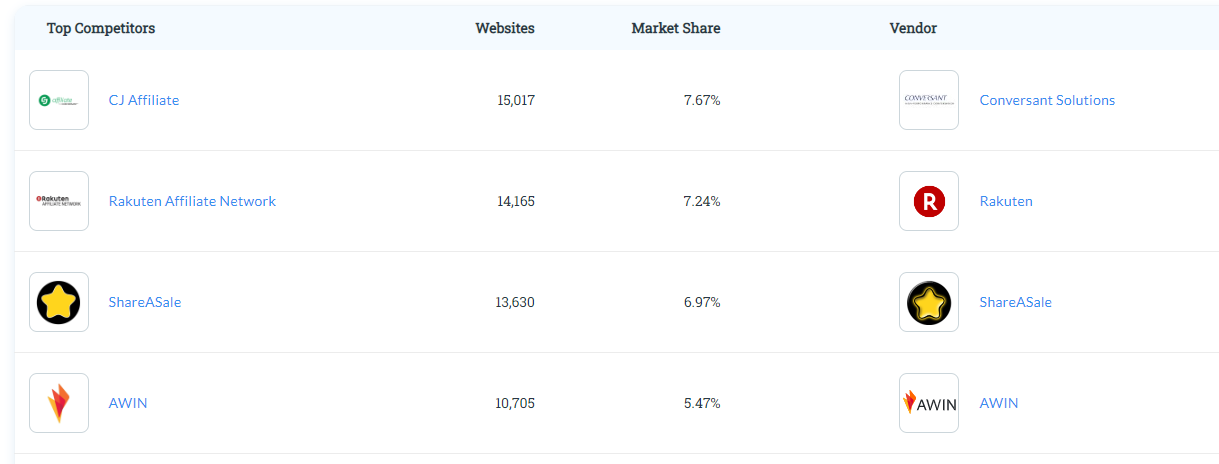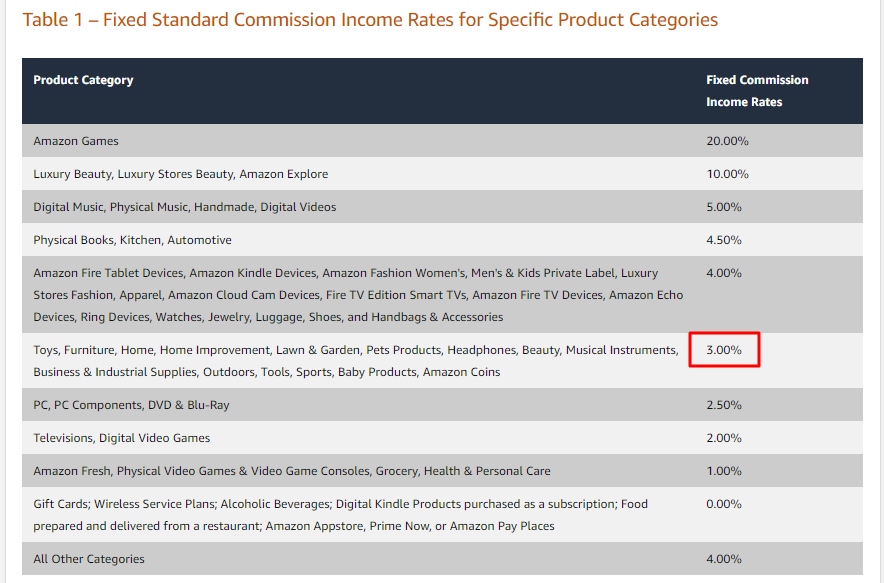What a loaded question. If someone asks you “Is affiliate marketing dead,” you don’t have to be a mind reader to guess that one of two things is true about the person asking that question:
- He/she tried an affiliate marketing course and isn’t making money.
- He/she is considering purchasing an affiliate marketing course, but knows some crusty world-weary guy at the end of the bar who said “Affiliate marketing … yeah, I tried that once … did pretty well at it. But let me tell you something, kid … affiliate marketing is dead!”
One person you won’t hear that question from is someone who made some of the $5.4 billion dollars earned by affiliate marketers in 2017, up from $1.6 billion in 2010 and expected to tip the scales at $8.2 billion by 2022.
Image via Statista
If affiliate marketing is dead, nobody told them, or if they did know then they have pulled a Frankenstein and revived it. The truth is, asking whether or not affiliate marketing is dead is the wrong question. Affiliate marketing will never die. What may die are sources of traffic that individual affiliate marketers or groups of affiliate marketers have come to depend on.
What Is Affiliate Marketing?
To understand why it isn’t too bold to state that affiliate marketing will never die, it helps to understand what affiliate marketing actually is.
An affiliate makes money by referring customers to a business, for which service the business pays the affiliate a commission. Nothing more than that. Sales commissions are as old as commerce itself.
Call it a “kickback,” a “payoff,” whatever you like—it has always been worth it for a business to pay a portion of their revenue on a sale to the person who brought them the sale.
Affiliate marketing looks more complicated now that browser cookies and tracking pixels are a thing, but affiliates existed long before cookies and pixels, and they will exist long after cookies and pixels give way to a new technology.
Businesses will always pay commissions to people that bring them customers. All an affiliate marketer needs is a stream of customers to refer to those businesses. That’s where traffic comes in.
Is Affiliate Marketing Worth It?
Yes, it is.
The so-called super affiliates make tens of thousands of dollars per month through affiliate marketing. Check out this Twitter thread from Andrew Fiebert, the founder of Lasso, where he shares how has generated $2.6 million in affiliate revenue since 2018.
Image via Twitter
Well, you’re not going to be making that amount in your first attempt with affiliate marketing, but with time you can even earn more than $1,000 in a day.
Generally, this is how much an affiliate marketer earns when you take a look at the full scope of their affiliate income:
- Total newbie – up to $1,000 per month
- Intermediate affiliate marketers – $1,000 – $10,000 per month
- High-level affiliate marketers – $10,000 – $100,000 per month
- Super affiliate marketers – over $100,000 per month
You May Also Like:
The Panda and the Penguin of the Apocalypse
There is no better example of the ground disappearing under an affiliate marketer’s feet than the “Panda” and “Penguin” updates to Google. The most crucial tool in an affiliate marketer’s toolbox has historically been the website. Affiliate marketers design a (hopefully) attractive website or blog, festoon it with affiliate links, publish it on the web, and wait for the money to roll in.
Of course, that website needs traffic. Affiliate marketers who couldn’t afford paid search usually relied on Search Engine Optimization (SEO), the complex and controversial process of tailoring a website such that it ranks high on Google searches. Most organic search traffic stops at Page 1 of the Google search with click-through rates dropping to 1% after 10th position, so effectively all the traffic comes from ranking on Page 1.
The thing is, there are no set roadmaps for successful SEO. In fact, Google doesn’t want people practicing SEO. They want sites to rise in relevance naturally due to the quality and popularity of the content. Search engines regard SEO as an attempt to rig their system. In 2011, Google announced an update called “Panda,” which applied a ranking modifier based on a ratio between a site’s reference queries and backlinks. A year later, Google doubled down with the “Penguin” update, which specifically targeted “black hat” (in short, manipulative) SEO tactics. The result: sites that didn’t make the cut got kicked off of Search Page 1 and out of the game permanently.
Affiliate Marketing Trends
Affiliate marketing has been growing steadily since its inception in the 80s. As the world became more digital, the technique became even more popular as affiliates found creative ways to promote their affiliate sites.
Brands have also been experiencing the benefits of this technique as evidenced by the growth of affiliate marketing spending.
Is affiliate marketing dead? Would brands be paying this much for affiliate marketing if they didn’t see its value?
Definitely not!
A rise in affiliate marketing spend means brands are getting a healthy ROI from their investment in affiliate programs.
In fact, many brands are expected to increase or maintain their affiliate marketing budget with marketing spend increasing to 8.1% up from 6.4% in 2021.
Publishers are also having a great time with affiliate marketing, with many looking forward to having more affiliate links on their websites.
Lotame conducted a survey in Dec 2020 and found that most publishers expect to generate more revenue through ecommerce. According to the study, 62% of publishers in the US rated affiliate marketing among their top three biggest revenue drivers for Q1, 2021.
Image via Lotame
As it stands, everything indicates that the affiliate marketing industry will continue to grow as many merchants continue to leverage the power of affiliate networks to bring in more customers.
You May Also Like:
- How to Start a Floral Business in 7 Simple Steps
- 31 Best Business Ideas for Small Towns to Know in 2022
Is Affiliate Marketing Dead? Why It Appears So
If the industry is growing, then what’s all this talk about affiliate marketing being dead?
Well, that’s because the affiliate marketing industry has changed so much that what worked 10 years ago may not be effective today. That’s why most marketers who haven’t adapted to the best affiliate marketing practices find themselves faced with many failures.
Below are 4 reasons why affiliate marketing may appear dead.
Increasing Competition
Back in the day, the only competition affiliate marketers had to deal with was other marketers. Right now, affiliate marketers are not just competing with each other. They also have to deal with big brands like The New York Times that bought the Wirecutter.
Image via Wirecutter
On top of that, we now have many people working from home as a result of the pandemic, and the growth of ecommerce.
All these factors have made it easy for people to get into affiliate marketing and start making money online. Businesses are also enjoying the benefits of such programs since they only pay when an affiliate brings a paying customer.
The growing interest in affiliate marketing has flooded the industry. This has increased the competition and tactics that worked back then are not as effective anymore.
Exclusivity
With many people getting into affiliate marketing to earn a smart passive income, online businesses are spoiled for choice when it comes to affiliates they can work with.
As a result, they are now very picky and don’t just accept anyone into their affiliate programs. Merchants now have strict requirements such as having:
- A successful blog
- A website
- An email list
These requirements have locked out many amateur affiliate marketers out of the affiliate marketing space, forcing them to wonder, “Is affiliate marketing dead?”.
You May Also Like:
- Best States to Form an LLC for Your Online Business
- 27 Low-Cost Online Businesses for Beginners to Start in 2022
- How to Brand Your Business: A Quick Guide
Tight Restrictions
In the early days of affiliate marketing, marketers would do anything to succeed.
Questionable affiliate marketers would use false advertising to generate sales. They would doctor images to make a product look good or even lie that a celebrity used their product.
They did all these to convince customers to buy a product. Some would get caught but their only punishment was getting their affiliate marketing accounts banned.
Once an account was suspended, an affiliate would simply open another one and continue with the dubious practices.
Nowadays, there are stricter rules and an affiliate marketer would be banned or even sued when they mislead customers. Once banned, technology has made it difficult to open a new account with the same credentials.
Since they are not able to continue their operations, suspended affiliate marketers are the ones wondering, “Is affiliate marketing dead?”.
Changes Made to Amazon Affiliate Program
Amazon Associates is Amazon’s affiliate program. It currently has the largest market share at 47.31%.
The top competitors of Amazon’s affiliate program include:
- CJ Affiliate – 7.67% market share
- Rakuten Affiliate Network – 7.24% market share
- ShareASale – 6.97% market share
- AWIN – 5.47% market share
Image via Datanyze
One of the reasons why people are asking “is affiliate marketing dead?” is because of the blow that Amazon delivered in April 2020.
Through a communication to all affiliate marketers on its program, Amazon slashed the commission in various categories, leaving many people wondering if their affiliate marketing efforts are worth it.
For example, the affiliate commission for furniture and home improvement products was reduced from 8% to 3%.
Image via Amazon
For some affiliate marketers, this update was upsetting. But to those who are only part of the Amazon affiliate program, the change is catastrophic.
How to Make Money as an Affiliate Marketer in 2024 and Beyond
Since we’ve already established affiliate marketing isn’t dead, let’s now discuss the strategies that will help you succeed in the industry.
The increased competition in the industry has made it difficult to make money as an affiliate marketer.
Successful affiliate marketers don’t have the luxury of no longer innovating. In fact, they have to keep innovating faster to stay competitive. Here are seven tips to make money as an affiliate marketer in 2024 and beyond:
Forget the Coupon Sites
There’s no way for an upshot coupon site to compete with big boys like retailmenot.com. It’s the classic case study of a former cash cow that went dry.
Cultivate Multiple Traffic Streams
Don’t just rely on one form of traffic, especially one as fickle as organic search. Pursue streams of traffic on platforms like YouTube, Instagram, paid search, and Facebook Ads.
Stay on the Cutting Edge
Instagram traffic is already consolidated around the “blue checkmark” profiles (verified influencers). Smart marketers already have their eyes peeled for the next big source of traffic.
Build an Email List
Most businesses don’t make a profit on the first sale; instead, they thrive on the back end. Once you have a sizable email list built from customers who like your content, you can sell to them multiple times, giving you breathing room if one of your traffic sources dries up.
Settle In for the Long Haul
Affiliate marketing is not a get-rich-quick proposition. It takes time, effort, and patience to build a money machine out of your affiliate business.
Build a Durable Brand
Forget about finding that magic “piggy bank” of qualified traffic and focus on building a brand customers love. That way they will follow you from your blog to Facebook to Instagram to YouTube to whatever platform is next. Such a brand can monetize in multiple ways, including coaching, eCommerce products, educational products, etc.
Do What You Love
Building a brand is a labor of love. Only seriously consider a niche you would create content for even if you weren’t paid. Months or years from now, you may be surprised to see that the affiliate dollars have started to roll in and you didn’t even notice it.
Track Everything
Track all the data from your affiliate marketing activities to know what’s working and what isn’t. You can use your affiliate network’s dashboard, social media analytics, or third-party tools to track your affiliate marketing efforts.
Some of the important metrics you need to track include conversions, total impressions, and earnings from the links you are promoting.
Use the Best Tools
Affiliate marketing is now more competitive than ever before. To succeed in the industry, you need to be using the best tools.
You need a tool to create cloaked affiliate links to keep them simple. You also need a way to promote your blog or website online to increase visibility. Lastly, you will need a tool to help you optimize your keyword strategies and analyze the competition.
Vet Your Product Owners
The only way to be a successful affiliate marketer is to refer your visitors to reputable sellers and product owners. Take time to verify the product owners to ensure their products and services are of high quality. They should also have excellent customer service and support the customers you refer with everything they need.
You May Also Like:
- How to Start Selling Cosmetics Online: 6 Best Practices
- What Are the Benefits of Having Multiple LLCs for Your Business?
FAQs
Q1. Does affiliate marketing work in 2024?
A. Yes, it does. Affiliate marketing still exists as a viable marketing strategy to generate customers for a business. This industry is still growing, with businesses in the US paying $8.2 billion in commissions in 2022.
Q2. Is affiliate marketing the future?
A. Yes, it is. Affiliate marketing is a performance-based form of marketing where brands only pay for a successful referral.With the cost of other marketing channels increasing, many businesses will turn to affiliate marketers to help them attract clients.
Q3. Is it too late for affiliate marketing?
A. No, it isn’t. Starting a sole proprietorship as an affiliate marketer is very easy and you can do it from home.To make money through commissions, you need to diversify your traffic sources to bring more visitors to your affiliate website.
Also, create valuable content and share it on social media platforms like Facebook Groups to let people know about the products you are promoting.
Q4. Why do most people fail at affiliate marketing?
A. Increased competition in the affiliate marketing space has pushed many affiliate marketers out of the industry. Most affiliate marketers are still using outdated strategies that are no longer effective, hence the reason for failure.
Q5. Is Affiliate marketing still profitable?
A. Yes, it is. The so-called super affiliates make up to $100,000 per month. As a newbie, you can expect to make up to $1,000 with the right strategy.
Long Live Affiliate Programs
Is affiliate marketing dead? No!
Sure, COVID, the growth of ecommerce, and technological advancements have all affected the affiliate marketing space, but it is still worth pursuing if you are willing to invest the time and effort.
It’s highly likely that your next-door neighbor has an affiliate site just like you. So, if you want to become a successful affiliate marketer you should be ready to work hard, use the best tools and create useful content that adds value to your target audience.
About the author
From selling flowers door-to-door at hair salons when he was 16 to starting his own auto detailing business, Brett Shapiro has had an entrepreneurial spirit since he was young. After earning a Bachelor of Arts degree in Global and International Studies from the University of California, Santa Barbara, and years traveling the world planning and executing cause marketing events, Brett decided to test out his entrepreneurial chops with his own medical supply distribution company.
During the formation of this business, Brett made a handful of simple, avoidable mistakes due to lack of experience and guidance. It was then that Brett realized there was a real, consistent need for a company to support businesses as they start, build and grow. He set his sights on creating Easy Doc Filing — an honest, transparent and simple resource center that takes care of the mundane, yet critical, formation documentation. Brett continues to lead Easy Doc Filing in developing services and partnerships that support and encourage entrepreneurship across all industries.
